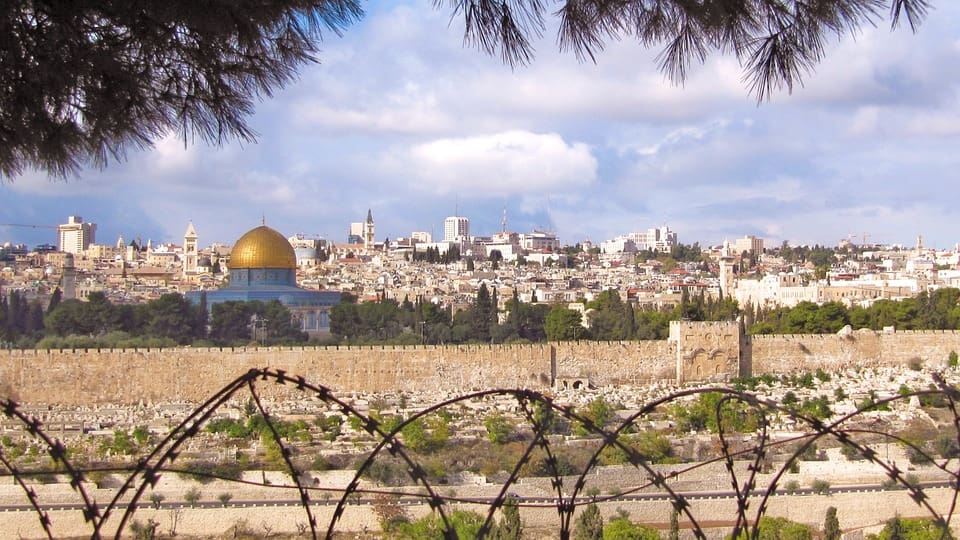
David Friedman, who has voiced approval of moving the US embassy from Tel Aviv to Jerusalem, is expected to be confirmed as US ambassador to Israel tomorrow. In the range of pieces selected below, Al-Shabaka analysts provide the context and analysis necessary to understand the history of Israel’s colonization of Jerusalem and its impact on Palestinians, as well as the likely fallout from a US embassy move.
Moving the US Embassy: The Fallout
Moving the US Embassy to Jerusalem Would Destroy Palestine’s Hopes of Justice
By Nur Arafeh
This Guardian op-ed by Arafeh argues that a US embassy move from Tel Aviv to Jerusalem would not only violate international law, but would also deny the Palestinian right to self-determination and freedom. She details the move’s potential consequences, including an increase in settlement construction and inflamed tensions. Read more…
On Trump’s Pledge to Move the US Embassy to Jerusalem
With Mouin Rabbani
In this expert Q&A for IMEU, Rabbani explains how the establishment of a US embassy in Jerusalem would mean an extreme U-turn in US policy — one that “would constitute an act of premeditated political pyromania with unforeseen local, regional, and global consequences.” Read more…
Israel’s Strategies – And Why They’re Wrong
Israel’s Dangerous New Transfer Tactic in Jerusalem
By Munir Nuseibah
Nuseibah’s Al-Shabaka commentary investigates the “breach of allegiance” to the state of Israel residency revocation policy and how it creates new Palestinian refugees and internally displaced persons, with the aim of maintaining a Jewish majority in Jerusalem. Read more…
Which Jerusalem? Israel’s Little-Known Master Plans
By Nur Arafeh
Arafeh’s in-depth policy brief for Al-Shabaka dissects Israel’s relatively unknown master plans and their aim to shape the city into a tourism and high-tech center, and the ways they use urban planning to reshape the city’s demography, to the detriment of Palestinians. (See also this panel discussion on Israel’s master plans, with Raja Khalidi, Maha Samman, and Nur Arafeh). Read more…
In Jerusalem, “Religious War” Is Used to Cloak Colonialism
By Nur Arafeh
Arafeh’s Al-Shabaka policy brief analyzes how the media and Israeli right wingers bill conflicts between Israeli settlers and Jerusalemite Palestinians as part of a “religious war,” though they are the outcome of longstanding Israeli plans to “Judaize” the city and empty it of its Palestinian inhabitants. Read more…
The Impact on the Palestinians in Jerusalem
More Israeli Settlements Will Mean Fewer Palestinians
By Munir Nuseibah
Nuseibah’s op-ed for The Hill recounts how Israeli settlement construction affects Palestinian individuals and families, and outlines how settlements and other displacement strategies are part of a larger Israeli plan to remove Palestinians from theWest Bank and Israel proper. Read more…
Living Under Israeli Policies of Colonization in East Jerusalem
Al-Shabaka, with five other civil society organizations and Visualizing Palestine, created graphics to raise awareness of Israel’s apartheid policies in Jerusalem, their effects on the Palestinian population, and the violations of international humanitarian and human rights law that arise. Read more…
Jerusalem: Israel’s Vision Vs. Palestine’s Reality
By Nur Arafeh
In this Al-Shabaka briefing, Arafeh details Israel’s continued efforts to “Judaize” Jerusalem and presents recommendations to halt these policies, as well as to improve the economy and society of East Jerusalem. Read more…
Economic Collapse in East Jerusalem: Strategies for Recovery
By Nur Arafeh
In yet another authoritative Al-Shabaka policy brief, Arafeh examines Israel’s deliberately engineered economic collapse of East Jerusalem through the deterioration of its tourism sector and the commercial markets of the Old City. Read more…
Looking Forward
The Future of Jerusalem: Sacred Space or Open City?
By Salim Tamari
Tamari, a renowned expert on Jerusalem, dissects for Al-Shabaka the origins of the sacrilization of Jerusalem and how it has obscured changes on the ground. He argues that proposals for the future of Jerusalem ignore the fact that at its core the conflict over the city is a case of colonial subjugation that must be addressed and resolved equitably. Read more…
Al-Shabaka’s Nur Arafeh, Munir Nuseibah, Mouin Rabbani, and Salim Tamari are available for media interviews. Please email [email protected] for more details.










